

VID: Colonising America. Jamestown, Québec, Santa Fe: Three North American Beginnings. Thirteen Colonies. The Thirteen Colonies were the British Colonies on the Atlantic coast of North America founded between 1607 (Virginia) and 1733 (Georgia) that joined together to declare independence in 1776.
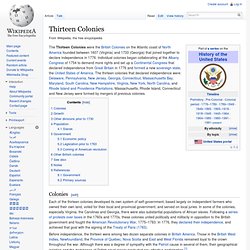
Individual colonies began collaborating at the Albany Congress of 1754 to demand more rights and set up a Continental Congress that declared independence from Great Britain in 1776 and formed a new sovereign state, the United States of America. The thirteen colonies that declared independence were: Delaware, Pennsylvania, New Jersey, Georgia, Connecticut, Massachusetts Bay, Maryland, South Carolina, New Hampshire, Virginia, New York, North Carolina, and Rhode Island and Providence Plantations. Massachusetts, Rhode Island, Connecticut and New Jersey were formed by mergers of previous colonies. Colonies[edit] Growth[edit] Freeman Vid 2 - Being a British Colonist. Freeman Vid 3 - Being a British American. Freeman Vid 4 - "Ever at Variance and Foolishly Jealous": Intercolonial Relations. The Colonial Experience. VID: Life in tne 13 colonies. Last revised: March, 2014 Acceptance of Terms Please read this Terms of Service Agreement ("Terms of Service", "Terms of Use") carefully.

These terms apply to Education Portal and its related websites owned and operated by Remilon, LLC ("Education Portal,", "Site", "Sites", "our", "us"). Education Portal provides the Services, which are defined below, to you subject to the following Terms of Service, which may be updated by us from time to time without notice to you. Colonial American Culture. My TV provider is not listed.
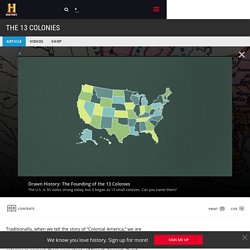
Why not? We are currently working on adding more TV providers. Please check back frequently to see if your TV provider has been added. Why do I need to log in to watch some video content? Viewers who verify their subscription to a TV provider get access to a deeper catalog of video content, including more full episodes. I am able to watch on TV.
This service is only available through participating TV providers. Life in the Southern Colonies (1) Detail of a map by Thomas Kitchin of the Southern colonies shortly after the conclusion of the French & Indian War and on the eve of Revolution.
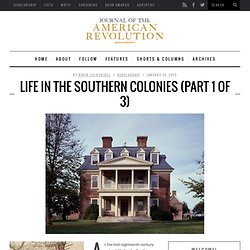
Source: Todd Andrlik As the mid-eighteenth century arrived, life for the Southern colonists was the best that the British colonial experience could ever have yielded. In almost every aspect of their lives, these peoples had achieved a standard of life not equaled even in the mature societies and economies of Western Europe. Life in the Southern Colonies (2) Continental Currency: One Third of a Dollar Read Part 1.
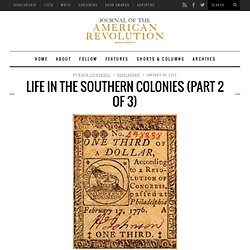
Life in the Southern Colonies (3) Charles Town Drawing.
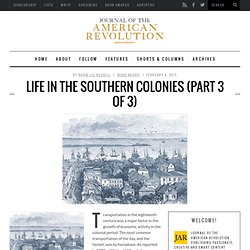
Source: Library of Congress. Early Amer Colonies: Pol/Econ. Early American Colonial Life: Politics & Economics Baltimore Town in 1752 by John Moale (Maryland Historical Society) I.
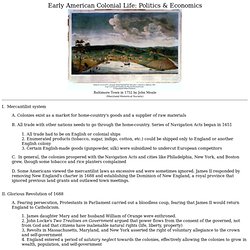
Mercantilist system A. Colonies exist as a market for home-country's goods and a supplier of raw materials B. VID: Economics in the 13 colonies. Last revised: March, 2014 Acceptance of Terms Please read this Terms of Service Agreement ("Terms of Service", "Terms of Use") carefully.
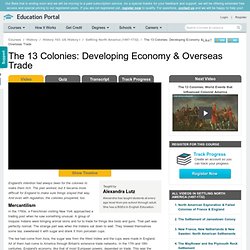
These terms apply to Education Portal and its related websites owned and operated by Remilon, LLC ("Education Portal,", "Site", "Sites", "our", "us"). Education Portal provides the Services, which are defined below, to you subject to the following Terms of Service, which may be updated by us from time to time without notice to you. Salutary Neglect. What Is Salutary Neglect? Mercantilism. Colonial government. VID+ English Settlement (1607-91) VID+ Growth & Empire (1663-1763) W.A. Speck, British America 1607-1776.
Alan Taylor: American Colonies. Alan Taylor - American Colonies. To write a history of colonial America used to be easier, because the human cast and the geographic range were both considered so much smaller.
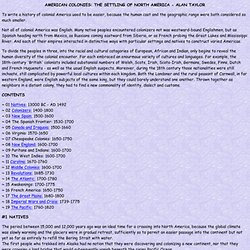
Not all of colonial America was English. Many native peoples encountered colonizers not was westward-bound Englishmen, but as Spanish heading north from Mexico, as Russians coming eastward from Siberia, or as French probing the Great Lakes and Mississippi River. And each of their empires interacted in distinctive ways with particular settings and natives to construct varied Americas. VID: Colonialism for Dummies. Johnny DEPP caused the AWI !! Ideas (4) Enlightenment thinking. United States Declaration of Independence. The Declaration of Independence is the usual name of a statement adopted by the Continental Congress on July 4, 1776, which announced that the thirteen American colonies, then at war with Great Britain, regarded themselves as 13 newly independent sovereign states, and no longer a part of the British Empire.
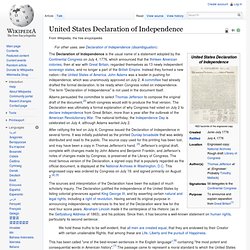
Instead they formed a new nation—the United States of America. John Adams was a leader in pushing for independence, which was unanimously approved on July 2. A committee had already drafted the formal declaration, to be ready when Congress voted on independence. Common Sense. Common Sense[1] is a pamphlet written by Thomas Paine in 1775–76 that inspired people in the Thirteen Colonies to declare and fight for independence from Great Britain in the summer of 1776. In clear, simple language it explained the advantages of and the need for immediate independence.
It was published anonymously on January 10, 1776, at the beginning of the American Revolution and became an immediate sensation. It was sold and distributed widely and read aloud at taverns and meeting places. Washington had it read to all his troops, which at the time had surrounded the British army in Boston. Rules By Which A Great Empire May Be Reduced To A Small One.
[Presented privately to a late Minister, when he entered upon his Administration; and now first published.] An ancient Sage valued himself upon this, that tho' he could not fiddle, he knew how to make a great City of a little one. The Science that I, a modern Simpleton, am about to communicate is the very reverse. I address myself to all Ministers who have the Management of extensive Dominions, which from their very Greatness are become troublesome to govern, because the Multiplicity of their Affairs leaves no Time for fiddling. O.A.R. Ep. 23: John Locke. American Enlightenment. Dates[edit] A switch from sectarian politics and established religion in many states to religious tolerance, ecumenicalism, and the disestablishment of state religion was one of the distinguishing features of the American Enlightenment. The passage of the new Connecticut Constitution on October 5, 1818, overturned the 180-year-old "Standing Order" and the The Connecticut Charter of 1662, whose provisions dated back to the founding of the state in 1638 and the Fundamental Orders of Connecticut; it has been proposed as a date for the triumph if not the end of the American Enlightenment.[9] The new constitution guaranteed freedom of religion, disestablished the Congregational church, and ended the last effective theocracy in America, as well overturning the last state constitution dating from the British Empire.
Republicanism[edit] J.G.A. Pocock explained the intellectual sources in America:[11] European sources[edit] Liberalism and republicanism[edit] First Great Awakening. America's Great Awakening George Whitefield, early America's greatest preacher I. VID: First Great Awakening. Last revised: March, 2014. Religion and the American Revolution - Religion and the Founding of the American Republic.
First Great Awakening. Ideas (3) "No taxation without representation"…